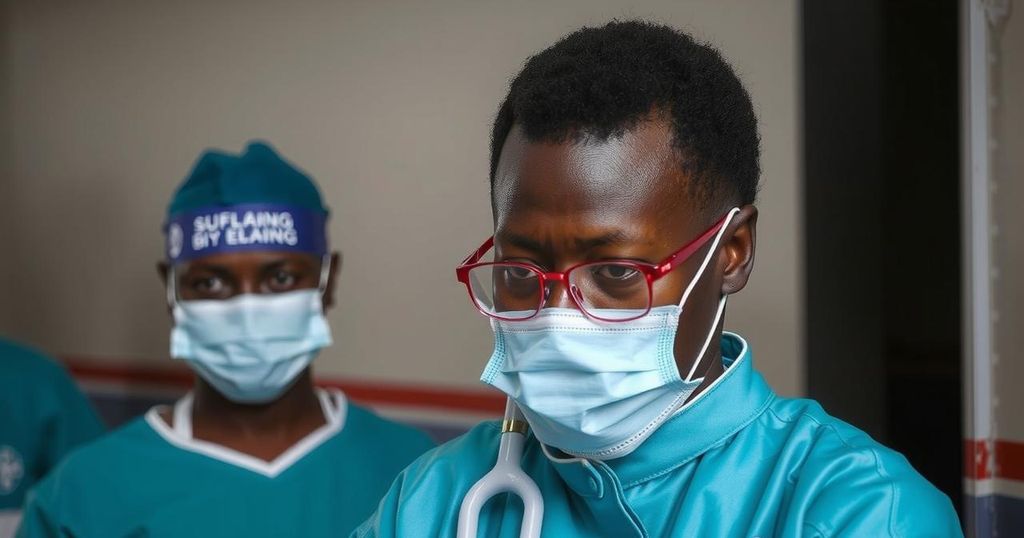Health officials in the Democratic Republic of Congo are alarmed by a mysterious illness that has led to over 70 deaths. Nearly 380 cases have been recorded, predominantly affecting young children. Symptoms resemble flu-like ailments, but the disease’s infectious nature or transmission route remains uncertain. Experts warn of potential epidemic risks while stressing the critical need for further diagnostics and public health enhancements in the region.
A nascent illness in the Democratic Republic of Congo (DRC) has prompted alarm among health officials following the death of over 70 individuals in the Panzi health zone, Kwango province. This area, located approximately 430 miles from Kinshasa, has recorded nearly 380 cases of the mysterious ailment, referred to as “Disease X,” with many cases involving young children. Symptoms have been likened to a flu-like illness, comprising fever, headache, cough, and anemia. Jean Kaseya, head of the Africa Centers for Disease Control and Prevention, noted the need for laboratory confirmation, emphasizing uncertainty regarding its infectious nature or transmission methods.
Currently, health authorities assert that there have been no confirmed cases beyond Panzi, although the rapid increase in cases and the alarming mortality rate have ignited concerns about a potential public health threat, especially given the region’s inadequate infrastructure. Dr. Peter Hotez from the Baylor College of Medicine highlighted how logistical challenges could impede swift emergency health responses due to poor transportation and healthcare frameworks.
Experts like Dr. Hotez and Dr. Gavin Harris from Emory University have voiced the many unknowns surrounding this disease. Dr. Hotez proposed potential diagnoses, suggesting that it may be severe malaria, meningococcal infection, or a viral pathogen, including possibly a new coronavirus or a zoonotic influenza strain. In contrast, Dr. Harris stressed the speculative nature of the reports due to the remote location, underscoring that diagnostic clarity may take time.
Both experts agree that unknown illnesses are relatively common, noting that much remains undiagnosed due to logistical hurdles in such rural and under-resourced regions. Dr. Hotez remarked that DRC has historically been a hub for emerging viral pathogens, while Dr. Harris pointed out that public health responses must wait until further testing can clarify the situation.
The potential for this illness to escalate into an epidemic raises additional questions. Factors such as the availability of countermeasures like vaccines and antidotes remain significant for curbing outbreaks. Dr. Hotez emphasized that having effective vaccines was critical in managing previous crises, such as the Ebola outbreak.
Dr. Harris argued the severity of concern rests on what this illness eventually proves to be, highlighting that increased frequency of such episodes may indicate broader systemic public health issues. Poor hygiene, malnutrition, and inadequate healthcare access exacerbate these risks, emphasizing the necessity for enhanced public health infrastructure. With the convergence of environmental changes and increased human activity, the likelihood of future outbreaks may be on the rise, requiring urgent and sustained public health measures.
In summary, the situation in the DRC represents a multifaceted public health dilemma, characterized by many unknowns and significant logistical challenges that must be addressed to effectively manage and contain emergent infectious diseases.
As we advance, it is crucial to reinforce the foundation of basic public health practices to counteract these threats and mitigate future risks.
The Democratic Republic of Congo (DRC) is currently facing a mysterious and deadly illness that has caused significant mortality in a rural region. More than 70 deaths have been reported in Panzi, Kwango province, with nearly 380 cases identified. Public health officials are particularly concerned due to the high number of cases among children. The symptoms are flu-like, but the exact nature and origin of the illness remain under investigation. Health experts acknowledge the logistical difficulties of accurate diagnostics in such remote areas, highlighting the urgency of understanding the disease’s characteristics and potential public health implications.
The emergence of a new illness in the Democratic Republic of Congo raises serious public health concerns, particularly due to the rapid increase in fatalities and the unclear nature of the disease. Experts emphasize the need for caution and thorough investigation while recognizing that the infrastructure challenges in the region complicate response efforts. Public health systems must be reinforced, and basic health measures improved to guard against viral threats, particularly as environmental and societal factors continue to evolve.
Original Source: www.usnews.com






